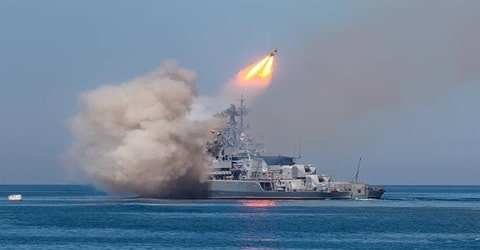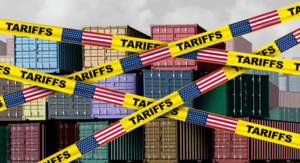
Impact of Ukraine Conflict on Russia's Naval Power in the Black Sea
Impact of Ukraine conflict on Russia’s naval power: Russian President Vladimir Putin’s vision of restoring Russia to its rightful place as a global power has long rested on dominating the Black Sea and projecting power in the Mediterranean and the Middle East. In the years before Russia’s full-scale invasion of Ukraine, Putin largely succeeded in that goal.
However, the Ukraine conflict has significantly undermined Russia’s naval power, disabling a substantial portion of its Black Sea Fleet. This strain has hindered Russia’s ability to project power and forced its military-industrial complex to prioritize domestic needs, potentially diminishing its influence in the Mediterranean and beyond.
Impact of Ukraine Conflict on Russia’s Naval Power
Russia’s strategic ambitions under President Vladimir Putin have long been centered on asserting dominance in key geopolitical regions, particularly the Black Sea and extending into the Mediterranean and Middle East. However, the ongoing conflict in Ukraine has significantly reshaped the landscape of Russian naval power, posing profound implications for its influence in these critical areas.
Here’s a detailed exploration of how the Ukraine conflict has impacted Russia’s naval capabilities in the Black Sea:
Read More: Impact of Sanctions on the Russian Economy
Table of Contents
1. Strategic Ambitions and Expansion in the Black Sea
Vladimir Putin’s vision of restoring Russia as a global power heavily relied on expanding its influence in the Black Sea region. Beginning with the occupation of Abkhazia in 2008 and culminating in the annexation of Crimea in 2014, Russia solidified control over strategic coastal areas, enhancing its ability to project power into neighboring regions.
The impact of Ukraine conflict on Russia’s naval power has, however, disrupted this trajectory, significantly weakening Russia’s ability to sustain its dominance in the Black Sea and projecting influence further into the Mediterranean and Middle East.
Read More: The Impact of Russia-Ukraine War on Bangladesh Economy
2. Black Sea Fleet and Mediterranean Projection
The Black Sea Fleet played a pivotal role in Russia’s broader strategy, supporting operations in the Mediterranean through its Mediterranean Squadron. This integration of naval capabilities across the Black Sea and Mediterranean allowed Russia to bolster its presence in the Middle East and North Africa, notably intervening in Syria and supporting forces in Libya.
However, the Impact of Ukraine conflict on Russia’s naval power has significantly strained its ability to maintain this integrated approach, potentially diminishing its influence in these strategic regions.
Read More: Iran-Israel Conflict
3. Impact of the Ukraine Conflict on Naval Assets
The war in Ukraine has exacted a heavy toll on Russia’s naval capabilities. Impact of Ukraine conflict on Russia’s naval power is evident as Ukrainian forces have reportedly disabled or destroyed a significant portion of Russian warships stationed in the Black Sea. This loss not only diminishes Russia’s immediate naval strength but also complicates its ability to project power into adjacent regions.
The strain on Russian naval assets highlights the broader challenges the Kremlin faces in maintaining its influence in the Mediterranean and the Middle East. Additionally, this weakening of naval power has forced Russia to prioritize domestic military needs over international aspirations, potentially reshaping its geopolitical strategies and reducing its global influence.
Read More: The Economics of War
4. Geopolitical Shifts and Strategic Constraints
The closure of the Bosphorus and Dardanelles straits by Turkey to Russian warships further restricts Russia’s ability to maneuver its naval assets between the Black Sea and Mediterranean. This logistical constraint, a significant impact of Ukraine conflict on Russia’s naval power, undermines Russia’s flexibility and operational effectiveness in both regions, curtailing its strategic ambitions.
As a result, the strained naval mobility hampers Russia’s capacity to project power and maintain a strong presence in these critical geopolitical spaces. This development not only challenges Putin’s vision of reestablishing Russia as a global power but also signals a potential decline in Russian influence in the Mediterranean and Middle East over time.
Read More: Geopolitical Tensions and Economic Projections in 2024
5. Economic and Military Realignment
The conflict has compelled Russia’s military-industrial complex to prioritize domestic needs over international exports, impacting its ability to sustain military operations abroad at previous scales. This shift signifies a strategic recalibration towards more cost-effective military interventions akin to its engagements in Libya rather than the resource-intensive campaigns seen in Syria.
Additionally, the ongoing Ukraine conflict has significantly impacted Russia’s naval power. Strained resources and international sanctions have hampered the modernization and maintenance of its naval fleet, leading to a decreased operational capacity in key regions like the Black Sea and the Mediterranean. This deterioration undermines Russia’s maritime influence, challenging its ability to project power and protect its strategic interests globally.
Read More: The Cost of De-Dollarization
6. Challenges to Military Performance and Influence
Reports of subpar performance of Russian weaponry in Ukraine raise concerns about the efficacy and reliability of Russian military hardware, potentially diminishing international interest in Russian arms. Additionally, the conflict has exposed vulnerabilities in Russia’s naval power, highlighting logistical and operational challenges.
This decline in naval capabilities, coupled with the broader issues in military hardware, could further erode Russia’s influence in regions where its military prowess traditionally held sway. The compounded impact of these setbacks might result in reduced geopolitical leverage and a reassessment of Russia’s strategic dominance, potentially altering the global balance of power and diminishing its ability to project force beyond its immediate borders.
7. Geopolitical Identity and Regional Dynamics
The evolving dynamics in the Middle East, exacerbated by conflicts such as the Gaza war, challenge Russia’s ability to balance relationships with regional powers like Israel and Iran. As Russia navigates these complexities amidst its own crisis in Ukraine, its geopolitical identity in the region reflects a return to Cold War-era alignments.
The impact of Ukraine conflict on Russia’s naval power further complicates this landscape, highlighting vulnerabilities in its strategic ambitions. This situation potentially alienates Western allies, as Russia’s engagements in the Middle East and its handling of crises like Gaza and Ukraine redefine its global stance. These challenges underscore a delicate balancing act for Moscow, influencing both regional dynamics and international perceptions.
Read More: Global Political Instability Signals for Rethinking Political Economics
Bottom Line
In conclusion, the Ukraine conflict represents a pivotal moment for Russia’s naval power in the Black Sea and its broader strategic ambitions in the Mediterranean and Middle East. The impact of Ukraine conflict on Russia’s naval power, including the loss of naval assets, logistical challenges, and economic constraints imposed by the conflict, is reshaping Russia’s geopolitical calculus.
As NATO and the European Union devise containment strategies against Russia, the interconnectedness of Black Sea and Mediterranean policies emerges as a critical factor in shaping regional stability and global power dynamics.
As Russia contends with these challenges, the future of its naval power and geopolitical influence hinges on its ability to adapt to shifting dynamics and navigate the complexities of international relations amidst the ongoing conflict in Ukraine.





